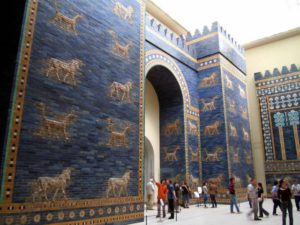
Gate of Ishtar. By Rictor Norton – https://www.flickr.com/photos/24065742@N00/151247206/, CC BY 2.0, https://commons.wikimedia.org/w/index.php?curid=1409322
Why Isaiah calls a non-Jewish king of Persia Israel’s anointed one
The Persian emperor Cyrus is honored as the only foreigner in the Bible to be identified as the “messiah” or “anointed one” of YHWH, the Israelite God.1 Isaiah tells us that YHWH spoke “to his messiah, to Cyrus, whom I [YHWH] took by his right hand to subdue nations before him” (Isaiah 45:1).]
The title messiah means “anointed.” It is an anglicization of the Hebrew meshiach (jyvm). In Greek it is rendered Christos (cristos)—English “Christ.”
Many people are anointed in the Hebrew Bible, and many are referred to as the “messiah” or “anointed one.” The high priest is called the “anointed priest” (Leviticus 4:3, 5, 16, 6:15). God tells Elijah to anoint two different men as kings of their people: Hazael as king of Aram (1 Kings 19:15) and Jehu son of Nimshi as king over Israel. God also instructs Elijah to anoint his own successor, Elisha son of Shaphat, as prophet (1 Kings 19:16). At this point in time, the term “messiah” or “anointed one” did not refer to the apocalyptic savior of humankind.